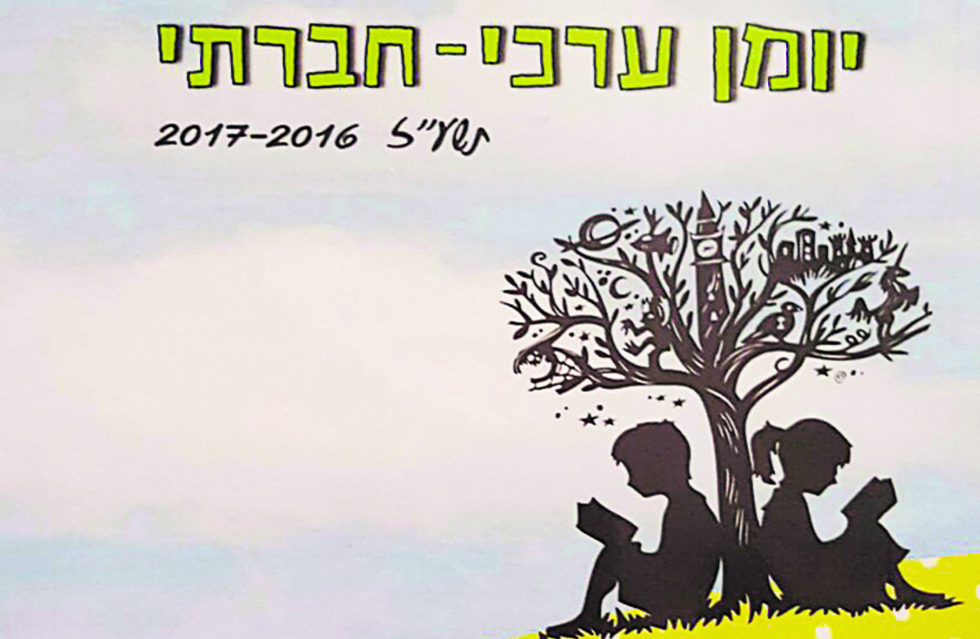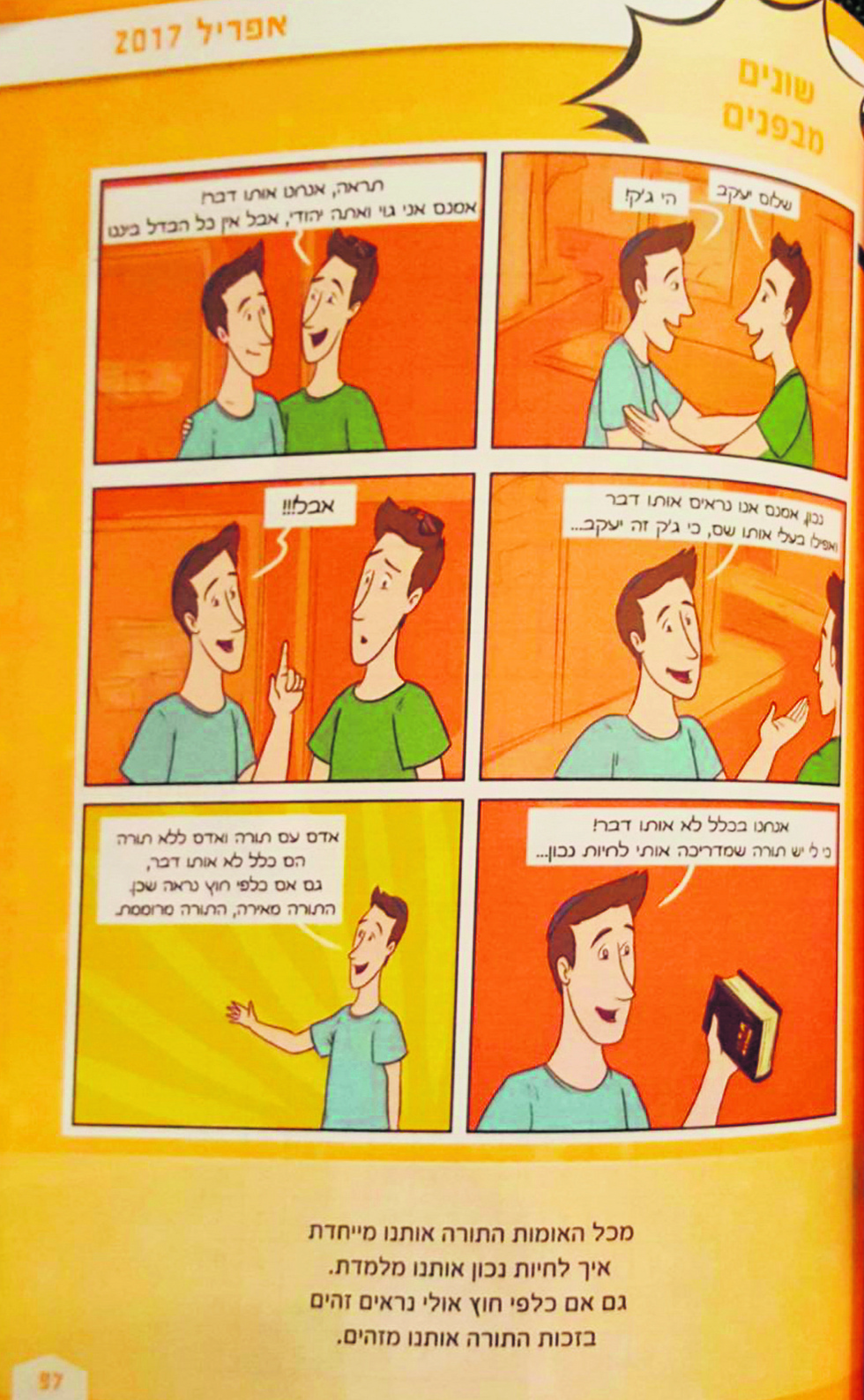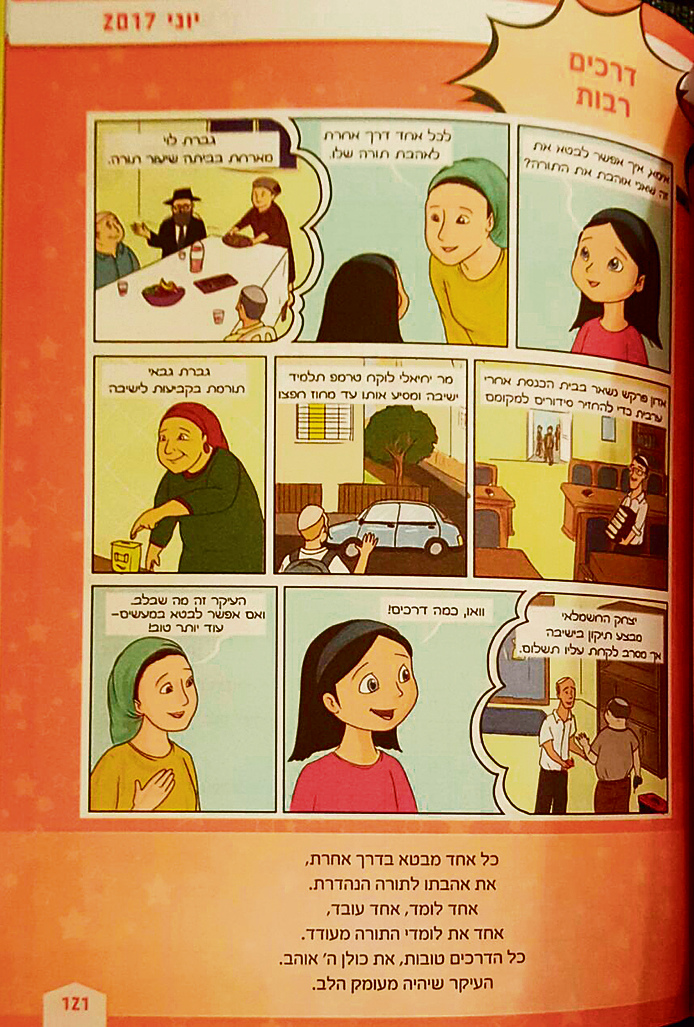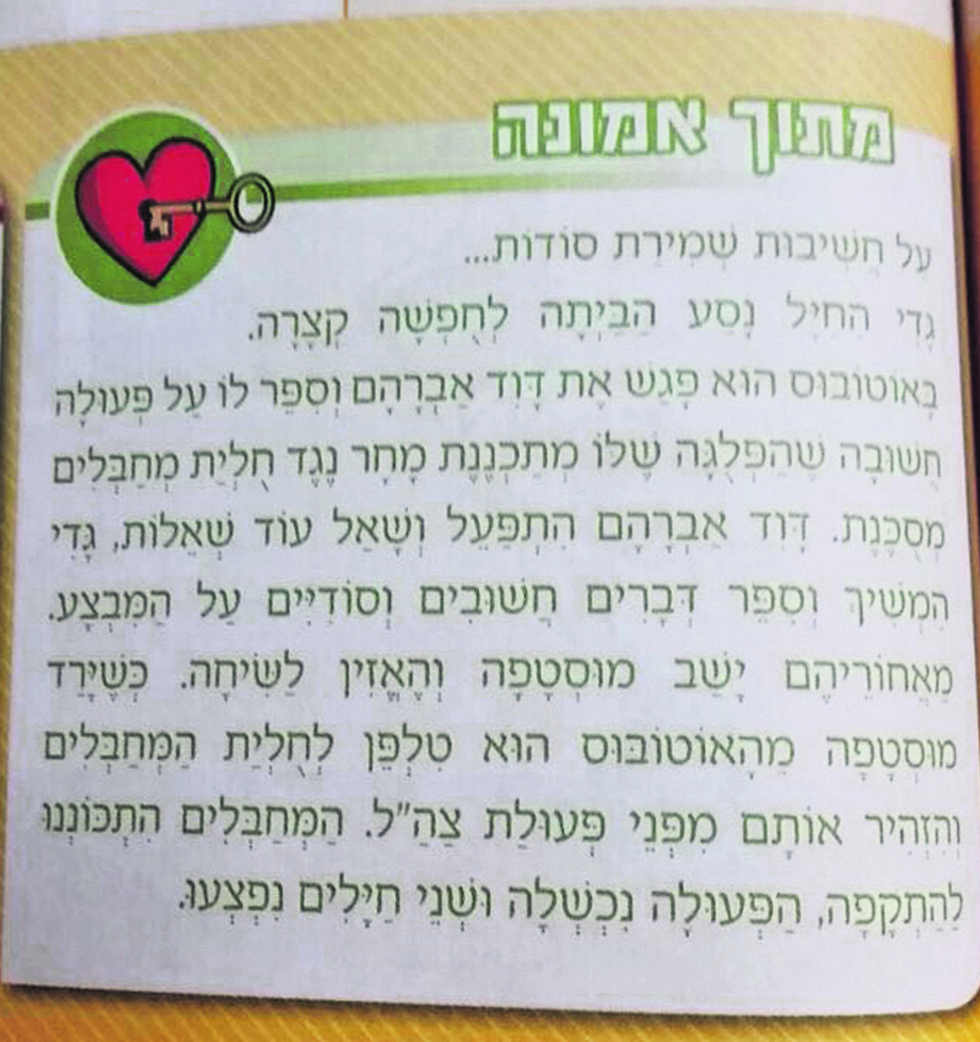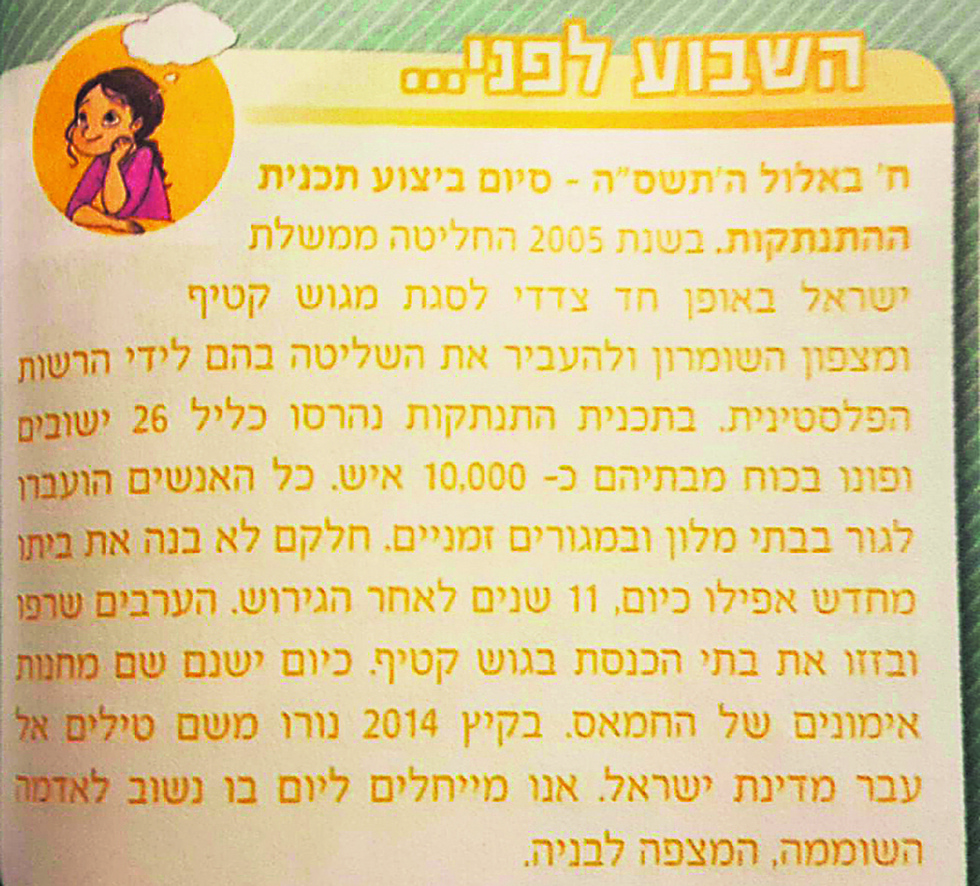
Daily planner for school kids encourages return to Gush Katif
Parents outraged at controversial planner given to elementary school children in the national-religious sector, which contains messages of Jewish superiority over the gentiles, religious preaching and problematic political texts concerning historic events.
"In 2005, Israel decided to unilaterally withdraw from Gush Katif and from the northern Samaria and hand the control over them to the Palestinian Authority," the daily planner tells the students. "During the Gaza Disengagement, 26 settlements were completely demolished, while 10,000 people were forcefully evacuated. The Arabs burned and looted the synagogues in Gush Katif. Now, there are Hamas training camps there. In the summer of 2014, rockets were fired from there at the State of Israel. We long for the day we could return to the desolate land, which waits to be built on."
The daily planner, like every other daily planner in the country, marks the anniversaries of events in Jewish and Israeli history, with one exception: The assassination of prime minister Yitzhak Rabin is not mentioned in it.
Gila Sidon, the principal of the Efrata elementary school in Jerusalem, wrote in a message to the patents that "a text about Rabin's murder was removed from the daily planner. As part of lessons on the topic ahead of the anniversary ceremony, the students will receive stickers with the missing text to put in their daily planner."
She went on to say that "Several parents pointed out two or three texts (in the daily planner) that were not in line with the school's values. Our school is pluralistic and welcomes a variety of opinions. We see this as an educational opportunity to have a conversation on the critical reading of texts and a discussion on the importance of avoiding generalizations and stereotyping."
'Similar but different'
The daily planner includes comic strips depicting different situations. One such comic strip shows a conversation between Yaakov the religious Jew, and the gentile Jack.During their conversation, Yaakov tells Jack that despite the fact they were similar—and even had a similar name—they were different, because "a man who has the Torah and one who doesn't are not the same at all, even if outwardly they appear to be. The Torah enlightens and elevates."
At the bottom of the page, a message appears: "Of all the nations, the Torah makes us special and teaches us how to live correctly. Even if outwardly we may look the same, thanks to the Torah we can be identified (as different)."
Another comic strip depicts a conversation between a mother and her daughter. The daughter wants to know how to express her love for the Torah. "We each express our love for the wonderful Torah differently," the message at the bottom of the page reads. "One studies, one works, one encourages those who study Torah. All ways are good, G-d loves them all. As long as it comes from the bottom of your heart."
Another page includes a story that teaches the children a lesson. "Gadi the soldier went home on a short break. On the bus, he met David Abraham and told him about an important operation his company was planning for the next day against a dangerous terror cell. Behind them sat Mustafa, who was listening to the conversation. When Mustafa got off the bus, he called the members of the terror cell and warned them of the IDF operation. The terrorists were ready for the raid, it failed, and two soldiers were wounded."
No Education Ministry approval
The daily planner was ordered by the school principals and it is financed using parents' annual payments to the school. Just like any other textbook given to students, the daily planner is subject to approval by the Religious Education Administration in the Education Ministry—but it wasn't approved.
The daily planners were produced as part of a project by an NGO called "Chiyuch LeArachim" ("Smile For Principles"), which works with dozens of national-religious schools across the country. It has not received authorization by the Religious Education Administration to produce texts for schools.
Chiyuch LeArachim was founded three years ago, and the documents it filed to the Justice Ministry's NGOs register don't state who funds its activities. These activities cost money, as the planner, for example, was sold to the school at a reduced price.
It is headed by Adir Raanan, an educator from the settlement of Elazar in Gush Etzion who works to teach and instill values to Israel's children. Among other things, a game he invented several years ago seeks to instill love for the Holy Temple and encourage the aspiration to rebuild it in children by having them build a model of the temple.
The "About" page on the NGO's website describes it as "a project started by educators from a variety of schools. The direct access the staff has to the different curriculums, along with the daily exposure to the students at national-religious schools, allow us to develop different linguistic products that serve both the student on the one hand and the education system on the other, while using leading educational methods and quality materials."
According to the NGO's site, about 80 national-religious schools are among its customers.
'Contrarian, radical discourse'
Many parents were outraged by the texts appearing in the daily planner and asked schools to stop using it."I don't think students in elementary schools need to be exposed to such content," said a mother of one of the students in Efrata. "Why do they need to receive such a daily planner? (The schools) could, instead, raise these issues for discussion during homeroom—that would be fine. But as soon as you replace the question mark with a period, the issue becomes very problematic."
Another mother to a 6th grader said her son will not take the daily planner with him to school. "The intention behind it was good. Students who keep obsessing over brands should get a daily planner with special messages, like information about important places in Israel and important milestones. This way, when a student writes in his daily planner, he also learns something—instead of obsessing over celebrities," she said.
"The idea is good, but the result is problematic. A daily planner that proclaims to be identified with the national-religious population—which I am very proud to be a part of—can't include expressions of disrespect and inequality towards the other or contrarian, radical discourse filled with inappropriate statements," she continued.
"There's no harm is telling the students about the Gaza disengagement, but why do they have to write that we must return to those lands? And why, for example, there is no text about Rabin's assassination?"
The Mahapach NGO, founded to represent a large left-wing public in Israel that feels there is no one to fight for its values, sent a letter to Education Minister Naftali Bennett last week concerning the daily planner.
According to Mahapach, the daily planner was purchased by 100 national-religious schools from across the country.
"As an education minister who declared himself, more than once, to be an education minister 'for everyone,' you should know that this daily planner contains texts that present the religious sector as a superior race to other groups in Israeli society," the left-wing NGO wrote.
"The religious Zionist sector has turned itself in recent years into a center of power, which is highly influential of public discourse, Israeli politics, the military and the media. That is its legitimate right. However, this does not given the people of this group the legitimacy to imbue racism, xenophobia and a patronizing attitude in young children. The State of Israel was founded on solidarity and shared responsibility, and those who disseminate such distorted values among their children are simply cutting off the branch we are all sitting on. There is nothing Jewish in the repulsive arrogance presented in the pages of the daily planner, there's nothing Zionist about thinking your faith gives you the right to dismiss other groups in your nation and country."
The Education Ministry said in response, "The ministry had nothing to do with the (production of the) daily planners, and if a purchase was indeed made, it was part of voluntary services offered. Be that as it may, in light of the questions on the matter, the ministry will look into the issue, including examining the daily planner's contents."
The Chiyuch LeArachim NGO declined to comment.










